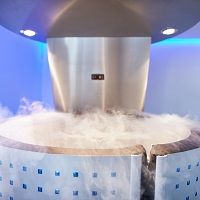Article
Trendy Cryotherapy Isn't FDA Approved, Presents Potential Health Hazards
Author(s):
You may have seen reports on the “treatment†on TV or heard that some of Beverley Hills’ richest citizens are raving about it, but whole body cryotherapy (WBC) doesn’t yet have the data to back up the many health benefits claimed by its boosters.

You may have seen reports on the “treatment” on TV or heard that some of Beverley Hills’ richest citizens are raving about it, but whole body cryotherapy (WBC) doesn’t yet have the data to back up the many health benefits claimed by its boosters.
WBC can be carried out in two ways. A single person could stand in a freezing tank that covers their torso and legs, but their head is not enclosed. The second way is where multiple people are totally enclosed in a chamber at frigid temperatures that are generated by liquid nitrogen.
Spas and wellness centers across the country say that it can help a variety of serious conditions, including: asthma, Alzheimer’s, anxiety, chronic pain, depression, fibromyalgia, insomnia, migraines, multiple sclerosis, osteoarthritis, rheumatoid arthritis, and weight loss. But the US Food and Drug Administration is speaking up on the matter and says that WBC has not been cleared or approved to help any of those conditions.
- MD Magazine is on Facebook, Twitter, Instagram, and LinkedIn!
“Based on purported health benefits seen in many promotions for cryotherapy spas, consumers may incorrectly believe that the FDA has cleared or approved WBC devices as safe and effective to treat medical conditions. This is not the case,” Aron Yustein, MD, a medical officer in the FDA’s Center for Devices and Radiological Health, said in a news release.
What may be even more alarming is that there is no scientific evidence that shows safety of WBC. “Given a growing interest from consumers in whole body cryotherapy, the FDA has informally reviewed the medical literature available on this subject,” Yustein continued. The FDA found very little evidence that showed safety or effectiveness of WBC as a treatment for any of the medical conditions that it’s been promoted as helping.
Although there are still a lot of questions about the potential harms of WBC, we know that liquid nitrogen can cause asphyxiation (severely deficient supply of oxygen to the body) which can lead to choking and result in tissue and organ problems.
So while WBC is promoted to help an array of painful and serious conditions, it does not have the FDA stamp of approval or data supporting it as a “treatment.”
Sign up for MD Magazine’s trending & breaking news >>> here.





